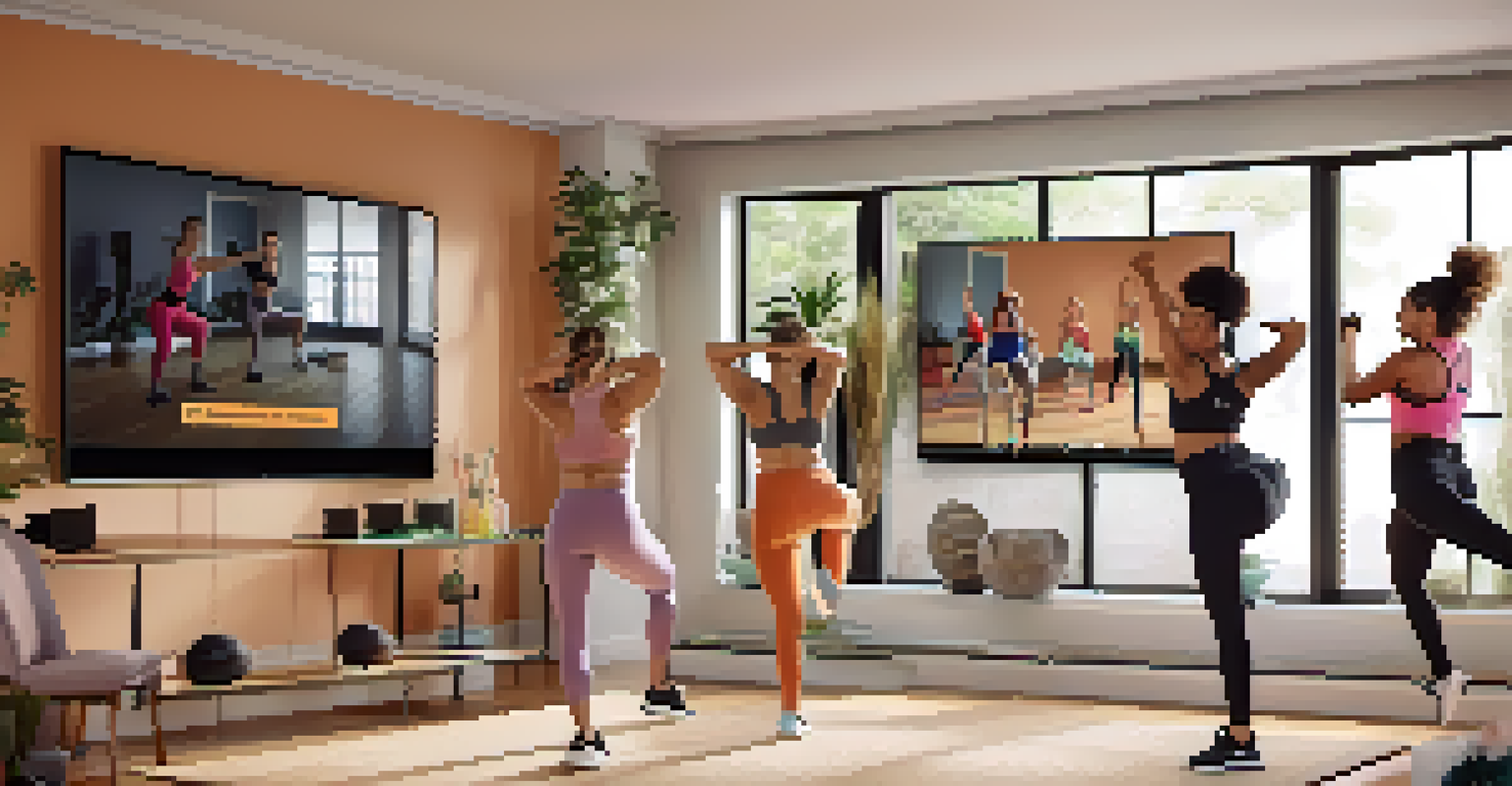How Virtual Fitness Training Supports Mental Well-being

Understanding the Link Between Fitness and Mental Health
Physical activity is well-known for its positive effects on mental health. When we engage in exercise, our bodies release endorphins, often called 'feel-good' hormones. This natural boost can alleviate feelings of stress and anxiety, making fitness a powerful tool for mental well-being.
Exercise is a celebration of what your body can do. Not a punishment for what you ate.
Virtual fitness training takes this concept further by making exercise more accessible. Whether it’s a yoga class on your living room floor or a high-energy dance workout, these online platforms remove barriers like travel time and gym intimidation. This accessibility encourages more people to participate in physical activity, enhancing their mental health.
Moreover, the convenience of virtual workouts allows individuals to fit exercise into their busy schedules. This flexibility means that even on the most hectic days, a quick session can be just a click away, helping maintain a consistent routine that supports mental well-being.
Building Community Through Online Fitness Platforms
One of the unexpected benefits of virtual fitness training is the sense of community it fosters. Many online platforms offer live classes where participants can interact, share experiences, and support one another. This social aspect can counter feelings of isolation that often accompany mental health struggles.

Additionally, virtual fitness groups often extend beyond the workout itself. Members may engage in discussions on mental health, share encouragement, and celebrate each other’s progress. This camaraderie not only enhances motivation but also creates a network of support that is crucial for mental well-being.
Fitness Boosts Mental Health
Engaging in physical activity releases endorphins, which alleviate stress and anxiety, highlighting fitness as a powerful tool for mental well-being.
In essence, the community aspect of virtual fitness can lead to meaningful connections. These relationships help participants feel less alone and more understood, which can be incredibly beneficial for those dealing with anxiety or depression.
Flexibility and Personalization in Virtual Workouts
Virtual fitness training offers a level of flexibility that traditional gyms often cannot match. Participants can choose from a variety of classes, formats, and intensity levels that suit their personal preferences and fitness goals. This personalization can empower individuals to take charge of their mental health by finding activities that truly resonate with them.
The greatest wealth is health.
For example, someone struggling with stress might opt for a calming yoga class, while another person might prefer a high-energy kickboxing session to blow off steam. This ability to tailor workouts to personal needs encourages a more positive relationship with exercise, which is a vital aspect of mental well-being.
By allowing individuals to experiment with different types of workouts, virtual training can help them discover what they enjoy most. This discovery process not only makes exercise more enjoyable but also reinforces the idea that taking care of one’s mental health can be a fun and fulfilling journey.
Accessing Professional Guidance Online
With virtual fitness training, accessing professional guidance has never been easier. Many platforms feature certified instructors who can provide valuable insights into both physical fitness and mental health strategies. This professional support can help individuals navigate their wellness journeys more effectively.
Moreover, instructors often incorporate mental wellness tips into their sessions, such as breathing exercises or mindfulness techniques. These practices can enhance the mental health benefits of physical activity, creating a holistic approach to well-being.
Community Support in Virtual Training
Online fitness platforms foster a sense of community, allowing participants to connect and support one another, which is essential for combating feelings of isolation.
Having professional guidance also encourages accountability. Knowing that an expert is there to support and motivate you can be a powerful factor in sticking to a fitness routine that benefits your mental health.
Incorporating Mindfulness into Virtual Fitness
Mindfulness has gained traction as a vital tool for mental well-being, and many virtual fitness programs incorporate it into their routines. Practices like yoga and Pilates emphasize breath control and present-moment awareness, which can significantly reduce stress levels. By focusing on the here and now, participants can escape the pressures of daily life.
Incorporating mindfulness into workouts not only enhances physical performance but also cultivates a sense of inner peace. This dual benefit makes virtual fitness training an excellent option for those looking to improve both their physical and mental health.
As participants grow more attuned to their bodies and minds, they often experience increased self-awareness and emotional resilience. This newfound perspective can lead to better coping strategies for dealing with life’s challenges, ultimately supporting overall mental well-being.
Fostering Routine and Stability in Uncertain Times
In times of uncertainty, having a routine can be incredibly grounding. Virtual fitness training provides a structured way to incorporate movement into daily life, helping to establish a sense of normalcy. This routine can make a significant difference in managing stress and anxiety, especially during challenging periods.
Joining regular online classes creates a commitment that individuals can look forward to each week. This anticipation can be a source of joy and motivation, reinforcing the positive impact that fitness has on mental health.
Flexibility Enhances Personalization
Virtual workouts offer customizable options that encourage individuals to choose activities that resonate with them, promoting a positive relationship with exercise.
Additionally, a predictable schedule helps individuals feel more in control of their lives. When external circumstances are unpredictable, maintaining a consistent workout routine can provide a much-needed anchor, promoting emotional stability and resilience.
The Importance of Celebrating Small Achievements
In virtual fitness training, celebrating small achievements is often encouraged, which can be a powerful motivator. Whether it’s mastering a new yoga pose or completing a challenging workout, recognizing these milestones helps individuals build confidence and a sense of accomplishment. This positive reinforcement plays a crucial role in enhancing mental well-being.
Moreover, sharing achievements within virtual communities fosters a supportive environment. When people celebrate each other's successes, it creates a culture of encouragement and positivity, which can be especially uplifting for those struggling with mental health issues.

Over time, these small victories can lead to significant changes in mindset. As individuals learn to appreciate their progress, they develop a more positive outlook on themselves and their capabilities, which is vital for maintaining mental health.
Conclusion: Embracing Virtual Fitness for Mindful Living
Virtual fitness training is more than just a way to stay active; it's a holistic approach that supports mental well-being. By blending physical activity with community engagement, mindfulness, and professional guidance, these platforms offer a unique opportunity to enhance mental health.
As we’ve explored, the benefits of virtual fitness extend far beyond the workout itself. They provide a pathway to build resilience, foster connections, and create a balanced lifestyle that prioritizes mental wellness.
Embracing virtual fitness can lead to a more mindful way of living, where individuals feel empowered to take charge of their health—both physical and mental. So, whether you’re a fitness enthusiast or just starting, consider how virtual workouts can support your journey toward better mental well-being.